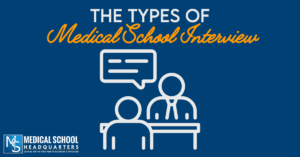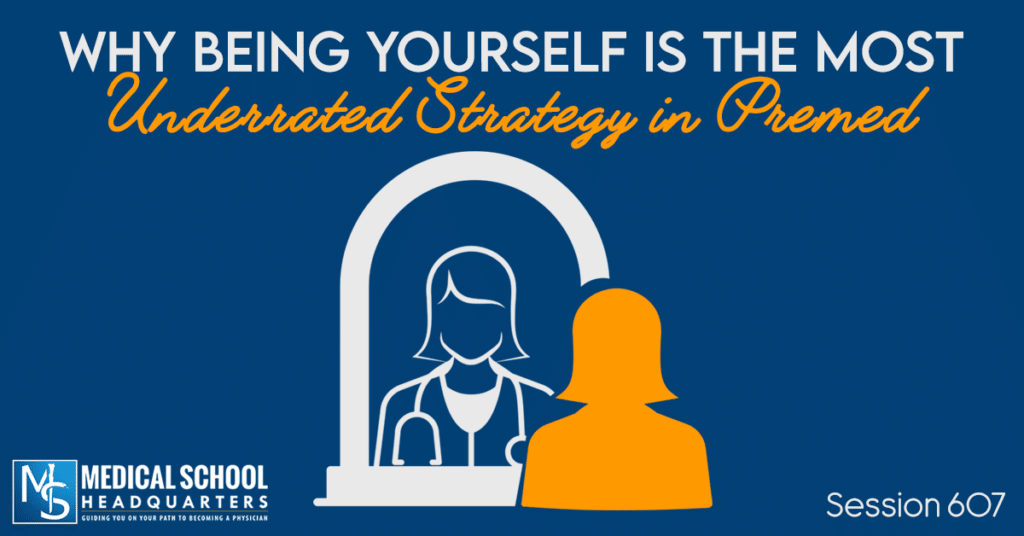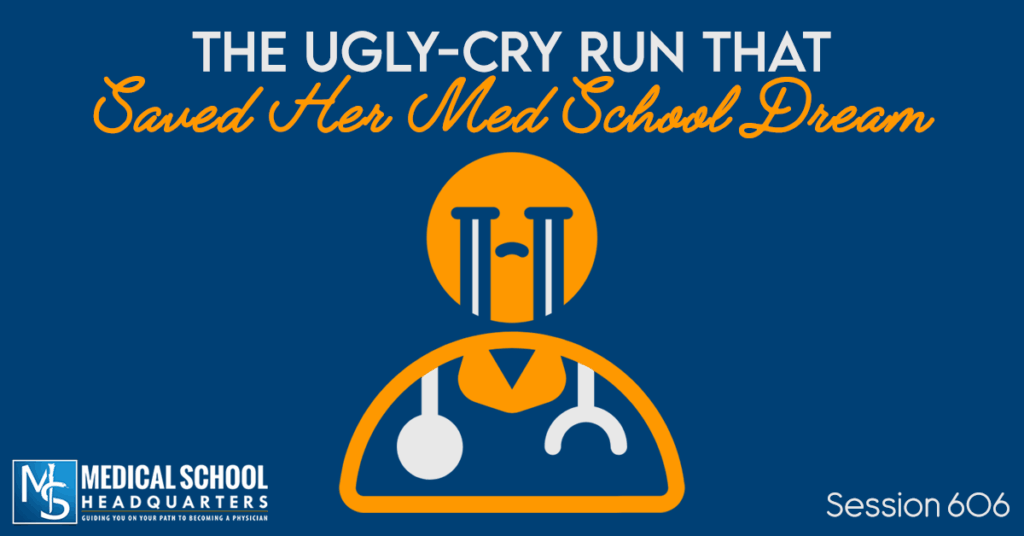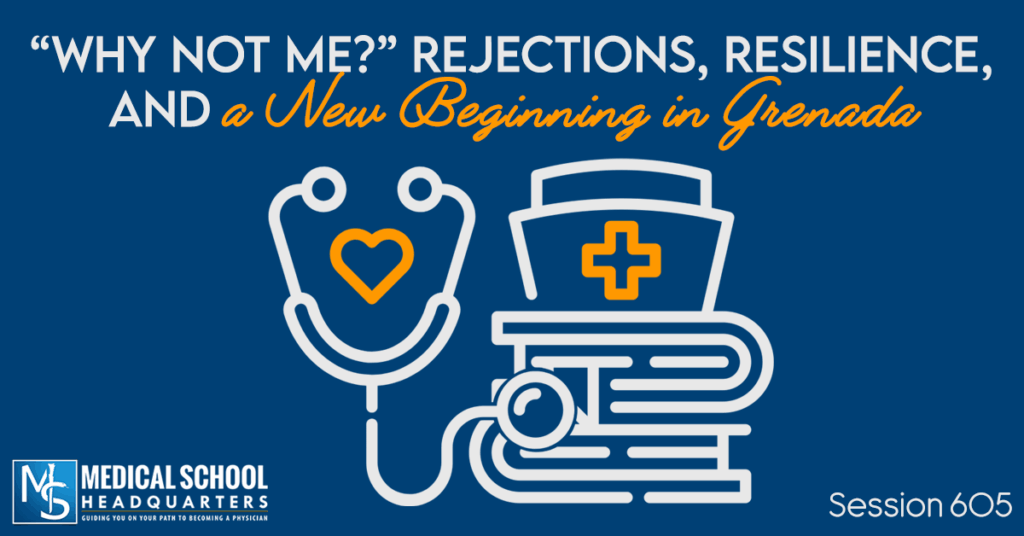If you’re reading this article because you’ve received an interview invitation, congrats! If you haven’t received one yet, it’s still good to prepare ahead of time. This way, once you get that interview invitation, you’re ready!
There are several types of interviews you may be asked to participate in. From the school’s website, your interview invitation, or reaching out, you’ll know what you can expect on interview day. The specific questions you’re asked will be a surprise, but the general format and flow of the interview day shouldn’t be. Each type of interview involves different questions, but the skills that will serve you well in one medical school interview will help in other interviews. You need to have good communication skills and answer what’s asked of you calmly, confidently, and clearly. The good news is that these are skills you can learn and practice.

Traditional One-on-One Interview
An open-file, traditional interview is likely to be what you think of when you imagine the medical school interview. You will meet one-on-one with an interviewer who has access to your entire application. Don’t assume that the interviewer has read your application or has reviewed it in great detail.
Although you shouldn’t assume the interviewer knows your application back and forth, you should come prepared to answer questions about it. The interviewer may ask you to explain your reasoning behind engaging in certain activities or why you included certain things. The interviewer may also reference things you included in your personal statement or other essays. You don’t want to be caught off guard or appear unfamiliar with your work. You’re likely to stumble over your answer if you get caught off guard. It may seem as if you didn’t adequately prepare for your interview.
Don’t avoid giving the best answer to a question just because that’s how you discussed it in your application. You don’t want to take away from yourself by giving a less-than-stellar answer. You may also be able to provide additional information or new insights you’ve gained. Don’t try to force an agenda in your answers, either. Let the conversation flow naturally as you and your interviewer get to know each other.
Closed-File or Partial-File Interview
In a closed interview, the interviewer doesn’t have access to any of your application information. They will assess you based on the interview alone. In a partial-file interview, the interviewer has access to some of, but not all, your application materials. They will typically not have access to your GPA and MCAT.
Some students may find this version of the medical school interview to be more conversational. You’re likely to be asked more questions about yourself and not feel the pressure to specifically talk about your application. Questions that relate to your application might include things like red flags they should expect instead of specific details. You might also be asked more generic questions like the classic “Tell me about yourself.”
You may also find that a closed-file interview allows you to steer the conversation more easily because the interviewer doesn’t have a list in mind of questions they need to ask about your application. Practice telling your story the way you want it told with mock interviews. You want to share your story in such a way that the interviewer is engaged with you and wants to ask more questions. This will allow the conversation to flow naturally.
Allowing the interviewer to connect with you on a personal level is why it’s so important to be yourself on interview day instead of making sure they know every line on your resume.
Panel Interview
A panel interview can seem really overwhelming, but if you take a deep breath and focus, you’ll be okay. In a panel interview, there are a group of interviewers in the room (or Zoom meeting) with you, who can all ask you questions. Your interviewers might be faculty, students, or hospital staff. After getting over the shock and fear of being interviewed by multiple people, treat it like any other interview. Listen carefully, and focus on the person speaking to you when the panel is asking you questions. When you’re answering questions, it’s a good idea to occasionally shift your eye contact between different members of the panel.
Group Interview
Like a panel interview, a group interview usually has several interviewers. The key difference is that you are not the only one answering questions. Part of the interviewers’ goal is to see how you work in a group and see whether you show respect for the other students and their speaking time. It’s easy to fall into the trap of thinking that you’re competing with the other students, but that’s not the case.
Your goal should be to listen carefully, respect the other students, and be able to follow up based on the answers they give. Don’t panic if the student before you answers a question the way you would have. Think of a way to expand upon what they said or connect it to something specific about yourself. Do your best, and everything will be okay.

Multiple Mini Interview
The multiple mini interview (or MMI) is probably the format you knew the least about before starting this process. It was designed in Canada by the team behind Casper, the situational judgment test. The goal of the MMI is to remove interviewer bias and increase the quality of students that medical schools accept. The reduction in bias benefits the student, as does the increased number of opportunities to shine. Instead of one to two interviews deciding your fate at that school, you have multiple opportunities to show who you are. It also allows students with diverse backgrounds and experiences to showcase that and the skills it has given them.
The MMI involves several stations that assess you on your empathy, ethical decision-making, communication skills, knowledge of world events and current topics in medicine, and critical thinking skills. A typical number of stations ranges from seven to ten, but every school is different, and an MMI may be combined with another type of interview on the same day.
At the beginning of the station, you’ll be allotted a certain amount of time to read the scenario and think about how you want to respond. You’ll then enter the room and be greeted by an interviewer or actor who will either ask you questions or role-play the scenario with you.
The interviewer for each session will generally have specific guidelines they will use to evaluate your performance. In a roleplay scenario, they might be assessing your ability to display empathy and consider all factors before solving the problem. If the question was about current events or an ethical dilemma, how well you explained your reasoning is more important than giving one “right” answer.
One of the best things about the MMI is that even if you perform poorly in one or two stations, you will have multiple other opportunities to perform well and save the day. That’s also a good reason to remember not to panic if you feel like you did poorly in one session. Take a moment to ground yourself, and then treat each other station as a brand new opportunity to shine.
Is One Type of Interview Better?
You might be wondering if there’s a type of interview you should hope for or if one is easier than the others. They all come with their benefits and downsides, just like anything else. This isn’t the question you should focus on because you can’t control the type of interview a school will choose, and it’s certainly not how you should choose which schools to apply to. Instead, you should focus on how to best prepare for each type of interview and how to bring your best self to interview day.
Let Us Help You Prepare for Your Interview
You can work with a Mappd Advisor on your interview prep by signing up here. Don’t underestimate the importance of mock interviews. Try to get at least one in with a mentor or one of our advisors. You can also do some prep on your own with our Interview Question Generator.
More Links and Resources
Why Was I Rejected After My Medical School Interview?






